-
The Greatest Story Never Told
› “If the pope is interested, everyone is interested,” said Alexandre Roulin, accepting the 2019 Environmental Peacebuilding Research Award in Irvine, California. The University of Lausanne professor’s project—on how conserving barn owls in the Middle East brings together people in Israel, Jordan, and Palestine across political divides—is certainly unique and intriguing. (Also, cute owls!)
“If the pope is interested, everyone is interested,” said Alexandre Roulin, accepting the 2019 Environmental Peacebuilding Research Award in Irvine, California. The University of Lausanne professor’s project—on how conserving barn owls in the Middle East brings together people in Israel, Jordan, and Palestine across political divides—is certainly unique and intriguing. (Also, cute owls!)The spiritual leader of the world’s 1 billion Catholics reached out to Roulin because the “Barn Owls Know No Boundaries” project promises a possible way to build peace in one of the world’s most intractable religious conflicts. A tremendous story, right?
But despite having all the hallmarks of a great tale, a quick Google search finds only a handful of stories about it. This lack of media attention is unfortunately an ongoing challenge for what I have long viewed as “the greatest story never told.”
-
Show Me! Laying the Foundation for the Next Generation of Environmental Peacebuilding
› As documented by the New Security Beat, environmental peacebuilding has grown dramatically as a field in recent years. Across the security, development, and diplomatic communities, there is increased recognition that disputes related to natural resources and the environment can escalate to violence, fund armed conflict, and provide an incentive for peace spoilers. At the same time, practitioners and researchers have highlighted numerous ways that natural resources and the environment can be a catalyst of peace by supporting livelihoods and economic recovery, underpinning basic services, and providing a context for dialogue and cooperation.
As documented by the New Security Beat, environmental peacebuilding has grown dramatically as a field in recent years. Across the security, development, and diplomatic communities, there is increased recognition that disputes related to natural resources and the environment can escalate to violence, fund armed conflict, and provide an incentive for peace spoilers. At the same time, practitioners and researchers have highlighted numerous ways that natural resources and the environment can be a catalyst of peace by supporting livelihoods and economic recovery, underpinning basic services, and providing a context for dialogue and cooperation. -
The Future of Climate Change and Peace
› As fires rage in Australia and in the Amazon, hurricanes ravage the Caribbean year after year, and glacial melt threatens entire communities in the high mountains of Asia and Europe, peace and climate activists might be forgiven for experiencing a growing sense of dread. Environmental events of this magnitude have the potential to simultaneously trigger new ecological disasters and strain social and political systems. The unprecedented challenges borne of the climate crisis will be far-reaching, from large-scale involuntary migration and food and water shortages, to biodiversity and ecosystem loss. These challenges require responses that build social cohesion rather than fuel conflict—responses that are collaborative, just, and climate-resilient.
As fires rage in Australia and in the Amazon, hurricanes ravage the Caribbean year after year, and glacial melt threatens entire communities in the high mountains of Asia and Europe, peace and climate activists might be forgiven for experiencing a growing sense of dread. Environmental events of this magnitude have the potential to simultaneously trigger new ecological disasters and strain social and political systems. The unprecedented challenges borne of the climate crisis will be far-reaching, from large-scale involuntary migration and food and water shortages, to biodiversity and ecosystem loss. These challenges require responses that build social cohesion rather than fuel conflict—responses that are collaborative, just, and climate-resilient. -
It’s Time We Scale Up Climate Leadership
› The urgency to address climate change is only growing. As youth step up and are increasingly vocal about climate change, international negotiations—most recently at COP25—fail to deliver the ambitious global action required for effective response.
The urgency to address climate change is only growing. As youth step up and are increasingly vocal about climate change, international negotiations—most recently at COP25—fail to deliver the ambitious global action required for effective response.Where does this leave the communities most at risk from climate impacts? How can they adapt and transform in the face of enormous threats, sometimes to their very existence? With researchers and policy experts often focused on technological fixes and pushing new solutions to specific threats, it’s easy to assume that transformation is underway to respond to the new climate reality. In reality, transformative change is tough—especially when up against ingrained habit, culture, and a lack of political and financial resources to support it. Perhaps most importantly, transformative change requires effective leadership and champions—those people who build political will and create momentum to move policy innovations or on-the-ground action.
-
Are We Radically Underestimating the Effects of Climate on Armed Conflict?
› Climate change is widely recognized as a “threat multiplier.” From the United Nations to the G7 to the US Department of Defense, there is emerging consensus that climate change poses risks to both human and natural security through a variety of complex and interrelated channels. The extent of those risks, and how they connect to armed conflict, however, remain widely debated.
Climate change is widely recognized as a “threat multiplier.” From the United Nations to the G7 to the US Department of Defense, there is emerging consensus that climate change poses risks to both human and natural security through a variety of complex and interrelated channels. The extent of those risks, and how they connect to armed conflict, however, remain widely debated. -
To Fight for a Living Planet, Restore its Biology
› We face the greatest environmental challenges ever relating to climate change, biodiversity, land use, and more. Humans are driving 1 million species to extinction, according to a report by the UN-backed Intergovernmental Science-Policy Platform on Biodiversity and Ecosystem Services. Some $44 trillion of annual global economic product that depend on nature are in jeopardy. Fires have ravaged large swathes of the Amazon—Brazil and Bolivia in particular—and Australia.
We face the greatest environmental challenges ever relating to climate change, biodiversity, land use, and more. Humans are driving 1 million species to extinction, according to a report by the UN-backed Intergovernmental Science-Policy Platform on Biodiversity and Ecosystem Services. Some $44 trillion of annual global economic product that depend on nature are in jeopardy. Fires have ravaged large swathes of the Amazon—Brazil and Bolivia in particular—and Australia. -
Why Climate and Conflict Are Shaping the Crises of Our Time (And What To Do About It)
› Humanitarian need is increasing. Crises are becoming more complex through the interactions between climate change, disasters, and conflicts. Not only are humanitarian crises on the rise, but the nature of crises is changing, largely due to climate change-driven extremes such as floods, droughts and typhoons. Over 90 percent of disasters are believed to be related to climate.
Humanitarian need is increasing. Crises are becoming more complex through the interactions between climate change, disasters, and conflicts. Not only are humanitarian crises on the rise, but the nature of crises is changing, largely due to climate change-driven extremes such as floods, droughts and typhoons. Over 90 percent of disasters are believed to be related to climate. -
Advancing One Health: Protecting People, Gorillas, and the Land on Which They Live
› In 2003, a scabies skin disease outbreak affecting mountain gorillas in Bwindi Impenetrable National Park was traced to people living around the national park—people with limited access to basic health and social services. To protect the people and wildlife of this special park, we launched Conservation Through Public Health (CTPH), an NGO that promotes biodiversity conservation by enabling people, gorillas, and other wildlife to coexist harmoniously through improved health and wellbeing.
In 2003, a scabies skin disease outbreak affecting mountain gorillas in Bwindi Impenetrable National Park was traced to people living around the national park—people with limited access to basic health and social services. To protect the people and wildlife of this special park, we launched Conservation Through Public Health (CTPH), an NGO that promotes biodiversity conservation by enabling people, gorillas, and other wildlife to coexist harmoniously through improved health and wellbeing.
Showing posts from category Uncharted Territory.


 “If the pope is interested, everyone is interested,” said Alexandre Roulin, accepting the 2019 Environmental Peacebuilding Research Award in Irvine, California. The University of Lausanne professor’s project—on how
“If the pope is interested, everyone is interested,” said Alexandre Roulin, accepting the 2019 Environmental Peacebuilding Research Award in Irvine, California. The University of Lausanne professor’s project—on how 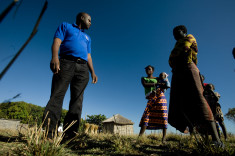 As documented by the New Security Beat, environmental peacebuilding has grown dramatically as a field in recent years. Across the security, development, and diplomatic communities, there is increased recognition that disputes related to natural resources and the environment can escalate to violence, fund armed conflict, and provide an incentive for peace spoilers. At the same time, practitioners and researchers have highlighted numerous ways that natural resources and the environment can be a catalyst of peace by supporting livelihoods and economic recovery, underpinning basic services, and providing a context for dialogue and cooperation.
As documented by the New Security Beat, environmental peacebuilding has grown dramatically as a field in recent years. Across the security, development, and diplomatic communities, there is increased recognition that disputes related to natural resources and the environment can escalate to violence, fund armed conflict, and provide an incentive for peace spoilers. At the same time, practitioners and researchers have highlighted numerous ways that natural resources and the environment can be a catalyst of peace by supporting livelihoods and economic recovery, underpinning basic services, and providing a context for dialogue and cooperation.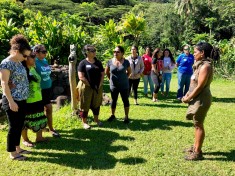 As fires rage in Australia and in the Amazon, hurricanes ravage the Caribbean year after year, and glacial melt threatens entire communities in the high mountains of Asia and Europe, peace and climate activists might be forgiven for experiencing a growing sense of dread. Environmental events of this magnitude have the potential to simultaneously trigger new ecological disasters and strain social and political systems. The unprecedented challenges borne of the climate crisis will be far-reaching, from large-scale involuntary migration and food and water shortages, to biodiversity and ecosystem loss. These challenges require responses that build social cohesion rather than fuel conflict—responses that are collaborative, just, and climate-resilient.
As fires rage in Australia and in the Amazon, hurricanes ravage the Caribbean year after year, and glacial melt threatens entire communities in the high mountains of Asia and Europe, peace and climate activists might be forgiven for experiencing a growing sense of dread. Environmental events of this magnitude have the potential to simultaneously trigger new ecological disasters and strain social and political systems. The unprecedented challenges borne of the climate crisis will be far-reaching, from large-scale involuntary migration and food and water shortages, to biodiversity and ecosystem loss. These challenges require responses that build social cohesion rather than fuel conflict—responses that are collaborative, just, and climate-resilient.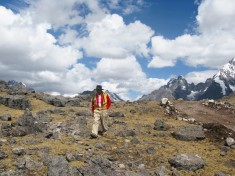 The urgency to address climate change is only growing. As youth step up and are increasingly vocal about climate change, international negotiations—most recently at COP25—fail to deliver the ambitious global action required for effective response.
The urgency to address climate change is only growing. As youth step up and are increasingly vocal about climate change, international negotiations—most recently at COP25—fail to deliver the ambitious global action required for effective response.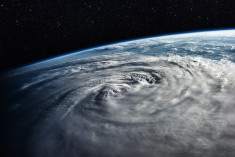 Climate change is widely recognized as a “threat multiplier.” From the
Climate change is widely recognized as a “threat multiplier.” From the 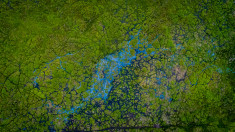 We face the greatest environmental challenges ever relating to climate change, biodiversity, land use, and more. Humans are driving 1 million species to extinction, according to a
We face the greatest environmental challenges ever relating to climate change, biodiversity, land use, and more. Humans are driving 1 million species to extinction, according to a 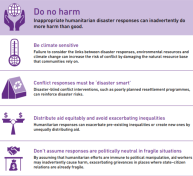 Humanitarian need is increasing. Crises are becoming more complex through the interactions between climate change, disasters, and conflicts. Not only are humanitarian crises on the rise, but the nature of crises is changing, largely due to climate change-driven extremes such as floods, droughts and typhoons. Over
Humanitarian need is increasing. Crises are becoming more complex through the interactions between climate change, disasters, and conflicts. Not only are humanitarian crises on the rise, but the nature of crises is changing, largely due to climate change-driven extremes such as floods, droughts and typhoons. Over 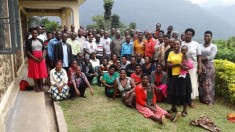 In 2003, a scabies skin disease outbreak affecting mountain gorillas in Bwindi Impenetrable National Park was traced to people living around the national park—people with limited access to basic health and social services. To protect the people and wildlife of this special park, we launched
In 2003, a scabies skin disease outbreak affecting mountain gorillas in Bwindi Impenetrable National Park was traced to people living around the national park—people with limited access to basic health and social services. To protect the people and wildlife of this special park, we launched 

